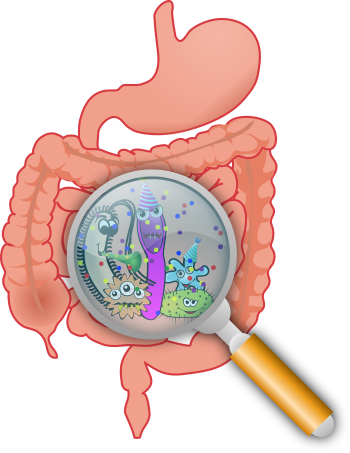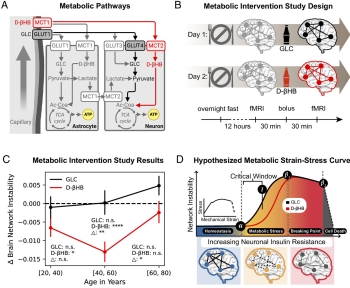News
Latest News List

Is Your Gut Sabotaging Your Meds?
The state of your gut has a surprising impact on your meds—and vice versa.

Scientists Just Found a Major Problem With Vitamin B12 Guidelines – And Your Brain Might Be at Risk
Your brain might not be getting enough B12 — even if your levels are considered “normal.” A new study suggests that older adults with lower B12, even within the accepted range, show signs of cognitive decline and brain damage. Researchers found that these individuals had slower thinking and reaction times, along with white matter lesions linked to dementia.

Calorie-free sweeteners can disrupt the brain's appetite signals, study finds
Sucralose increased hunger and activity in the hypothalamus, especially in people with obesity. It also changed the way the hypothalamus communicated with other brain regions. Unlike sugar, sucralose did not increase blood levels of certain hormones that create a feeling of fullness.

Study confirms link between maternal diet and risk to infant behavioural health
Maternal diet during pregnancy, specifically during the third trimester, may be associated with a higher risk for mental health disorders in offspring, researchers discover

'Healthy' vitamin B12 levels not enough to ward off neuro decline: Experts call for new recommendations for older adults
Meeting the minimum requirement for vitamin B12, needed to make DNA, red blood cells and nerve tissue, may not actually be enough—particularly if you are older. It may even put you at risk for cognitive impairment.

Ultra-processed babies: are toddler snacks one of the great food scandals of our time?
For time-poor parents, straws, sticks, pouches and powders can seem like a quick, convenient and even healthy option. But these oversweetened, mushy foods are creating a generation of choosy consumers whose teeth are already rotting

Six months of breastfeeding tied to lower odds of developmental delays
"In this study, breastfeeding persistence was associated with lower incidence of developmental delays..."

Chronic sucrose consumption in mice reveals organ-specific metabolic disruptions
The findings stress the urgent need for policies and awareness campaigns to reduce sugar-sweetened beverage consumption, particularly among vulnerable populations.

Children who lack fish in their diets are less sociable and kind, study finds
Children who consumed the least amounts of seafood at 7-years-old were likely to be less ‘prosocial’ at ages 7 and 9 years than those who regularly consumed seafood, according to a new study. ‘Prosocial’ behaviour includes friendly interactions, altruism, and sharing.

Diet-related brain inflammation: Three days of high-fat eating impair memory in aged rats
This study suggests that high fat diets evoked neuroinflammation, memory impairment, and anxiety-like behaviour.

Scientists identify critical 'midlife window' for preventing age-related brain decline
These findings could revolutionise approaches to preventing age-related cognitive decline and neurodegenerative diseases like Alzheimer's.

Out-of-balance gut bacteria are linked to multiple sclerosis—the ratio can predict severity of disease
In our research, we found that the ratio of two bacteria in the gut can predict multiple sclerosis severity in patients, highlighting the importance of the microbiome and gut health in this disease.

Nangs are popular with young people. But are they aware of the serious harms of nitrous oxide?
Nitrous oxide – also known as laughing gas or nangs – is cheap, widely available and popular among young people. Yet it often flies under the radar in public health programs and education settings. Young people (aged 18 to 25) who have used nitrous oxide are often unaware of its risks – even when they reported symptoms such as “brain fog” and seizures.

Five days of ultra-processed food: Study finds that's enough to alter insulin and reward functions in the brain
Disruptions in the brain's normal reward learning response, suggests just five days of overeating could prime the brain for long-term unhealthy eating patterns

High dietary fish intake may slow disability progression in multiple sclerosis, study suggests
A high dietary intake of lean and oily fish may slow the progression of disability in people with multiple sclerosis (MS), suggests a comparative population-based study, published online in the Journal of Neurology Neurosurgery & Psychiatry.

Lifestyle choices during pregnancy can impact child's motor development up to the age of 5–6 years
A mother-child study conducted at the University of Turku and Turku University Hospital in Finland investigated the long-term effects of maternal risk factors on the child's motor development at the age of 5–6 years.

Antidepressants May Worsen Dementia, Study Shows
Neuroscientists find dementia patients on antidepressants show faster decline.

Antidepressants linked to faster cognitive decline in dementia
New research suggests that antidepressants can accelerate cognitive decline in people with dementia.

Trouble Staying Still: ADHD's Identity Crisis
Professor Sally Marlow reveals the changing faces of ADHD, and asks why it still grabs the headlines and why there are so many contradictions surrounding it.

Water and plain milk are the healthiest drinks for kids, say experts
"Choosing healthy beverages for children is just as important as choosing healthy foods..."
- <
- 1
- 2
- 3
- 4
- 5
- 6
- 7
- 8
- 9
- 10
- 11
- 12
- 13
- 14
- 15
- 16
- 17
- 18
- 19
- 20
- 21
- 22
- 23
- 24
- 25
- 26
- 27
- 28
- 29
- 30
- 31
- 32
- 33
- 34
- 35
- 36
- 37
- 38
- 39
- 40
- 41
- 42
- 43
- 44
- 45
- 46
- 47
- 48
- 49
- 50
- 51
- 52
- 53
- 54
- 55
- 56
- 57
- 58
- 59
- 60
- 61
- 62
- 63
- 64
- 65
- 66
- 67
- 68
- 69
- 70
- 71
- 72
- 73
- 74
- 75
- 76
- 77
- 78
- 79
- 80
- 81
- 82
- 83
- 84
- 85
- 86
- 87
- 88
- 89
- 90
- 91
- 92
- 93
- 94
- 95
- 96
- 97
- 98
- 99
- 100
- 101
- 102
- 103
- 104
- 105
- 106
- 107
- 108
- 109
- 110
- 111
- 112
- 113
- 114
- 115
- 116
- 117
- 118
- 119
- 120
- 121
- 122
- 123
- 124
- 125
- 126
- 127
- 128
- 129
- 130
- 131
- 132
- 133
- 134
- 135
- 136
- 137
- 138
- 139
- 140
- 141
- 142
- 143
- 144
- 145
- 146
- 147
- 148
- 149
- 150
- 151
- 152
- 153
- 154
- 155
- 156
- 157
- >
